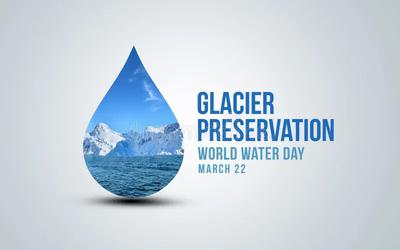- Home
World Water Day: Glaciers Preservation
March 22, 2025
World Water Day, observed on March 22, highlights global water challenges. This year’s theme
emphasizes Glacier Preservation, as they are vital for Earth’s water balance and ecosystems.
Glaciers, covering 10% of land and storing 75% of freshwater, are under threat from climate
change and human activities, making their protection urgent.
Glaciers are indispensable to life on Earth. They act as natural regulators of freshwater supply,
releasing meltwater into rivers and lakes, which sustains billions of people, especially in arid
regions. Glaciers also support biodiversity by providing habitats for unique species and
influencing weather patterns. Moreover, they are crucial for agriculture, hydropower, and
drinking water in many parts of the world. Their loss would disrupt ecosystems, threaten food
security, and intensify water scarcity, particularly in regions dependent on glacial meltwater.
Despite their importance, human activities are accelerating the melting of glaciers. The burning
of fossil fuels, deforestation, and industrial emissions have significantly increased greenhouse
gas concentrations, leading to global warming. Rising temperatures are also causing glaciers to
melt at an unprecedented rate. Additionally, pollution, such as black carbon from vehicles and
factories, settles on glacier surfaces, reducing their ability to reflect sunlight and further
accelerating melting. These activities push glaciers to a tipping point, with dire consequences for
the planet.
The melting of glaciers has far-reaching adverse effects, including rising sea levels and coastal
erosion. In Ghana, a country with a coastline stretching over 500 kilometers, the impacts are
already being felt. Rising sea levels, driven by glacial melt, are eroding coastal lands, destroying
infrastructure, and displacing communities. Coastal towns like Keta and Ada are experiencing
severe coastal erosion, directly affecting over 3000 individuals and forcing residents to abandon
their homes and livelihoods. This displacement not only disrupts lives but also places additional
pressure on urban areas, increasing social and economic challenges.
To preserve glaciers and mitigate their melting, urgent action is needed. Reducing greenhouse
gas emissions is paramount, requiring a global shift to renewable energy sources like solar and
wind power. Reforestation and sustainable land-use practices can also help absorb carbon
dioxide from the atmosphere. On an individual level, adopting energy-efficient practices and
reducing waste can contribute to the fight against climate change. Additionally, international
cooperation is essential to monitor glacier health, implement conservation policies, and support
vulnerable communities affected by glacial melt.
On this World Water Day, let us recognise the critical role glaciers play in sustaining life and
take collective action to preserve them. Addressing the root causes of glacier melting and
promoting sustainable practices can safeguard these icy giants for future generations and ensure
a resilient and water-secure world.
The author, Solomon Amfoh, is a Senior Environmental Officer at the Institute of Green
Growth Solutions, Accra

-
July 14, 2025
-
June 5, 2025
-
March 22, 2025
-
March 21, 2025
-
March 20, 2025
-
Oct. 1, 2025
6 a.m. - 6 p.m. -
Aug. 28, 2019
9 a.m. - 5 p.m. -
Aug. 23, 2018
8:30 a.m. -
Oct. 31, 2017
9 a.m. - 3 p.m. -
March 17, 2017
10 a.m. - 3 p.m.



